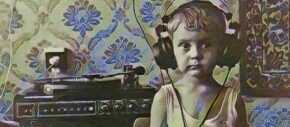
Original script: Ben Wright and William Conrad
An analysis of Shakespeare’s Hamlet argues that he is the true villain of the play. Featuring Ben Wright, William Conrad, John McIntire.
Original radio play: Henry E. Fritsch
A polling firm is hired by the Devil to conduct research to predict how many new sinners Hell is likely to be receiving over the next twenty years. Featuring Joseph Julian, Robert Dryden, Elaine Rost.
Author: Robert Nathan
A pair of astronauts arrives on Venus only to discover that it is populated by a host of bizarre life forms, including sentient vegetables. The radio play was later turned into a short story, ‘A Pride of Carrots’, first published in The Magazine of Fantasy and Science Fiction, in December 1959. Featuring Robert Nathan (narrator), Elaine Burke, Ted Bliss, Daws Butler, June Foray, Alan Reed, Bill Thompson.
Author: Robert Nathan
Archaeologists in the year 7956 explore the abandoned ruins of the long-dead civilization of North America, and attempt to decipher the meanings of its strange artifacts. Based on a short story, ‘Digging the Weans’, first published in Harper’s Magazine, in November 1956; together with another story, ‘A Further Report on the Weans’, this was later expanded into a book, The Weans, in 1960. Featuring Hans Conried, Edgar Barrier, Byron Kane, Jay Novello, June Foray.
Author: David Karp
This is about a funny man, who isn’t really, and his wife who doesn’t love him, but really does. A story of a man who lives by laughter told in part by the woman who married him and who shares the crazy life. Featuring Henry Morgan, Elspeth Eric, Bryna Raeburn, Luis Van Rooten.
Authors: Frederik Pohl and Cyril M. Kornbluth
In a future dominated and controlled by advertising agencies, an executive in one of these firms is assigned the campaign to persuade people to move to Venus, despite its extremely harsh, hostile environment. Based on a novel of the same name first published in 1953 (adapted from a serial published in Galaxy Science Fiction magazine, as ‘Gravy Planet’, in 1952). Featuring Staats Cottsworth, Ralph Bell, Virginia Kaye, Ian Martin, Robert Readick, Ralph Camargo, Robert Dryden.
Author: Charles B. Smith
A story told in verse about a railroad locomotive and its experiences during the Civil War and the westward expansion. Featuring William Conrad (narrator), Daws Butler, Jack Moyles, Dick Crenna, Joe diSantis, Jack Kruschen.
Original script: Jules Menklen
A documentary examining a mid-air collision between two planes over California air space that scattered debris over Pacoima Junior High School, causing death and destruction. Featuring Frank Goss.
Original script: Mort Goldberg
A pair of tape recorders discuss the techniques of recording and editing for radio. Featuring Jackson Beck, Ian Martin, Bill Quinn, Ralph Bell.
Original radio play: Richard Durham
After gaining his freedom, a slave in antebellum South Carolina attempts to inspire his fellow slaves to follow him in seeking liberty. Featuring Parley Baer, Roy Glenn, Ed Marr, Paul Frees, Harry Bartell.
:
:
The CBS Radio Workshop was an experimental dramatic radio anthology series that aired on CBS from January 27, 1956, until September 22, 1957. Subtitled “radio’s distinguished series to man’s imagination,” it was a revival of several earlier series on CBS — Columbia Experimental Laboratory (1931), Columbia Experimental Dramatic Laboratory (1932) and Columbia Workshop (1936-1943, 1946-47). Some of the same writers and directors employed on the earlier series were involved in the 1950s revival. The CBS Radio Workshop was one of American network radio’s last attempts to hold on to, and perhaps recapture, some of the demographics they had lost to television in the post-World War II era.
